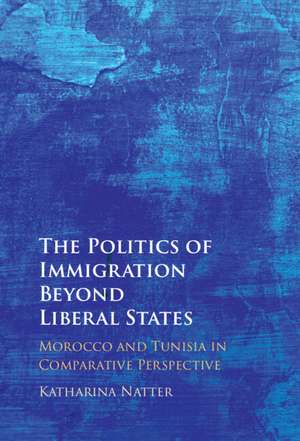The Politics of Immigration Beyond Liberal States: Morocco and Tunisia in Comparative Perspective
Autor Katharina Natteren Limba Engleză Hardback – 7 dec 2022
| Toate formatele și edițiile | Preț | Express |
|---|---|---|
| Paperback (1) | 230.79 lei 6-8 săpt. | |
| Cambridge University Press – 5 sep 2024 | 230.79 lei 6-8 săpt. | |
| Hardback (1) | 585.78 lei 6-8 săpt. | |
| Cambridge University Press – 7 dec 2022 | 585.78 lei 6-8 săpt. |
Preț: 585.78 lei
Preț vechi: 658.18 lei
-11% Nou
Puncte Express: 879
Preț estimativ în valută:
112.09€ • 119.86$ • 93.46£
112.09€ • 119.86$ • 93.46£
Carte tipărită la comandă
Livrare economică 17 aprilie-01 mai
Preluare comenzi: 021 569.72.76
Specificații
ISBN-13: 9781009262620
ISBN-10: 1009262629
Pagini: 280
Dimensiuni: 152 x 229 x 19 mm
Greutate: 0.61 kg
Editura: Cambridge University Press
Colecția Cambridge University Press
Locul publicării:Cambridge, United Kingdom
ISBN-10: 1009262629
Pagini: 280
Dimensiuni: 152 x 229 x 19 mm
Greutate: 0.61 kg
Editura: Cambridge University Press
Colecția Cambridge University Press
Locul publicării:Cambridge, United Kingdom
Cuprins
1. Introduction; 2. Theories on the move; 3. The contrasting cases of Morocco and Tunisia; 4. Regime continuity and immigration policy change in Morocco; 5. The illiberal paradox of autocratic policymaking; 6. Regime change and immigration policy continuity in Tunisia; 7. The ambiguous effects of democratization; 8. Immigration politics and state transformation in Morocco and Tunisia; 9. Conclusion.
Recenzii
'This important book offers original insights into immigration politics in liberal and illiberal regimes. With in-depth analysis of immigration politics in Morocco and Tunisia, it joins a venerable tradition of scholarship that successfully uses immigration as a lens for understanding the functioning of modern states.' Christina Boswell, University of Edinburgh
'This is the most comprehensive and systematic attempt to map the relation between political systems and migration politics in North Africa that has been written to date. Combining nuance for the historical past and attention to a present in transition, Natter builds a convincing analysis that will be of immense interest to scholars of migration.' Lorena Gazzotti, University of Cambridge
'In this highly original work, Natter examines the relationship between regime type, democratization, and shifts in migration and refugee policies. Her findings challenge conventional wisdom about migration governance in autocratic regimes while breaking down what she sees as the artificial dichotomy of the Global North and South.' James F. Hollifield, Southern Methodist University
'Katharina Natter makes a crucial contribution to the nascent literature on immigration politics across the Global South. Natter's empirically-rich and analytically-astute comparison of Tunisian and Moroccan policymaking offers valuable insights into how migration, regime politics, and the modern state remain intricately tied together.' Gerasimos Tsourapas, University of Glasgow
'This is the most comprehensive and systematic attempt to map the relation between political systems and migration politics in North Africa that has been written to date. Combining nuance for the historical past and attention to a present in transition, Natter builds a convincing analysis that will be of immense interest to scholars of migration.' Lorena Gazzotti, University of Cambridge
'In this highly original work, Natter examines the relationship between regime type, democratization, and shifts in migration and refugee policies. Her findings challenge conventional wisdom about migration governance in autocratic regimes while breaking down what she sees as the artificial dichotomy of the Global North and South.' James F. Hollifield, Southern Methodist University
'Katharina Natter makes a crucial contribution to the nascent literature on immigration politics across the Global South. Natter's empirically-rich and analytically-astute comparison of Tunisian and Moroccan policymaking offers valuable insights into how migration, regime politics, and the modern state remain intricately tied together.' Gerasimos Tsourapas, University of Glasgow
Notă biografică
Descriere
Compares authoritarian Morocco and democratizing Tunisia to examine whether autocracies make fundamentally different immigration policies than democracies.
